Interview: Ubisoft on Reinventing Assassin's Creed, High-Fiving George Washington
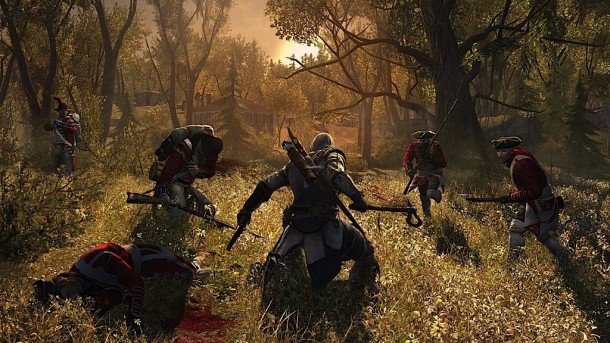
With the release of last year's Assassin's Creed: Revelations, it seemed like Ubisoft's annual release policy was finally catching up to its favorite fleet-footed franchise. It was hard not to see Ezio's wispy gray hair and tired, age-darkened eyes as indicators of the state of the entire Assassin's Creed franchise. Feature bloat had taken its toll on a series that once thrived on elegant simplicity. Desmond's first-person sections, random tower-defense-esque minigames, and bombs, bombs, and more bombs portrayed a series fumbling around in the darkness, vainly attempting to re-bottle the magic that had once made it so special.
Enter Assassin's Creed III.
In development since Assassin's Creed II fearlessly swan-dived out of Ubisoft's nest, the upcoming game could be a wonderful change of pace for hidden blade aficionados the world over. Will the new Native American setting be enough to propel Assassin's Creed forward by a meaningful amount, though? And how can Connor hope to continue in Altair and Ezio's grand tradition of death from above when he's out roaming the wilderness? What about period-specific themes like slavery and freedom? Perhaps equally important: can we punch bears? I sat down with creative director Alex Hutchinson, senior producer Francois Pelland, and associate producer Jean-Francois Boivin to ask those questions and many, many more.
PC Gamer: Why did you go with the Revolutionary War setting?
Alex Hutchinson: Well, it's different. Everyone had been itching for a new character and a new period, so we knew we wanted to go somewhere quite radically different... It was a nice clean break, this notion of coming to a new continent--not just a new city, but an entire new country--was really juicy. And it's a place that other games can't go. You can't set a shooter here. The guns are too terrible. The idea that everyone would say, "I don't see how that's going to work", is great. That's our job: make it work.
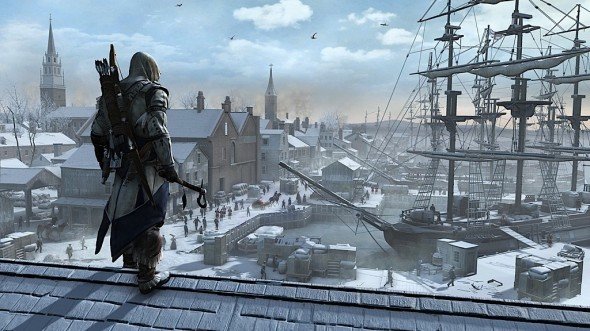
PCG: Two of the themes you mentioned for the game is slavery and freedom. Those can be pretty sensitive subjects. How are you going to broach those topics?
AH: We're lucky, I think, in that we're historical. So generally the things that are happening [in-game] happened [in real life]. We have that defense. We're just describing an event. We have stats that we're using, the percentage of slaves in each city, percentage of Native Americans living in each city, types of jobs-–that sort of thing.
Keep up to date with the most important stories and the best deals, as picked by the PC Gamer team.
But we're not going to tackle slavery head-on. If we were doing the Civil War, obviously, then it would come up. But in this period it's not really a hot topic. When you're starting, you have people like John Adams' wife, Jefferson, and a few other people who were opposed to it, but in general it's not the focus. At this point, most slaves were in the south. Field workers were having a much harder life than the slaves in the north, who were often carriage drivers and things like that. It wasn't as big of a deal, unfortunately.
PCG: So Assassin's Creed III takes place over the course of 30 or so years. How much are you focusing on the way the world changes? You said you've got seasons and weather and stuff, but will the actual cities evolve? The people, what they're wearing-–will those things change?
AH: Not so much what they're wearing. There wasn't much change as far as that. But big events like the fire in New York will be seen, or the fact that the British leave Boston. They stay in New York until well after the war, but the disappearance of redcoats from Boston will be visible.
The man, the myth, the assassin
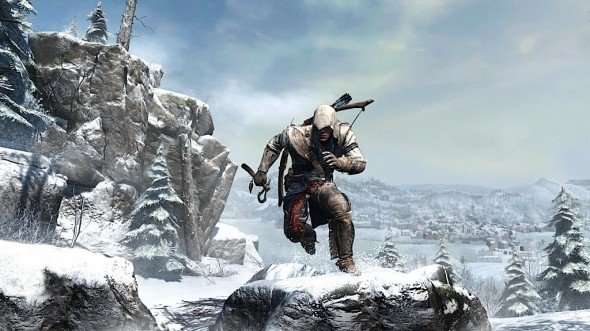
PCG: Earlier, you brought up the subject of “possibility space” characters. You mentioned that, after the first game in Ezio's trilogy, he'd explored his different avenues as a character, so you kind of ran into a dead end in terms of growth. With Connor, are you trying to avoid that? Are you holding off on certain plot points and conflicts in preparation for future games?
AH: You should never be afraid of having to come up with new ideas. So no, we're going to put in as much as we possibly can with him. I think we're doing a better job, as we were saying, of planning the future of the franchise. So we're more aware of what's next and what's happening-–although of course we're not allowed to say anything about that. By [planning further ahead], we sort of take out some of the risks of that.
PCG: Connor seems like a very violent, brutally efficient dude. I mean, Ezio was very animated and flamboyant, whereas Connor, at least from the brief scenes that we saw, looks a lot more to the point.
AH: Yeah, he's more reserved. It's hard to follow a character like Ezio, because he's so iconic and over-the-top. So we deliberately wanted to go in the other direction and make someone more empathetic who tries to help people. If you think about it, Ezio is quite selfish. He's hunting Borgias because they killed his dad. He doesn't ever talk about how he's helping humanity. He just wants to kill the guys who killed his dad. We wanted a character in this one who's trying to right wrongs. We think he's going to be someone who's easier to get along with for a long period of time. But it is a challenge making him pop as much as Ezio.
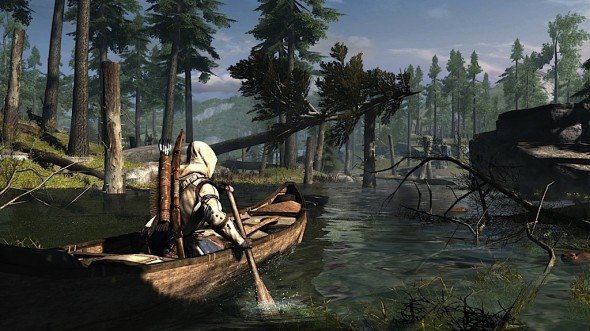
PCG: How does his Native American heritage help define who he is?
AH: Well, his initial motivation is to help his people. Also, you see it in his gear. You should see it in each scene, in his reaction to the specifics of it. Julian talked about him being more in touch with nature, more okay with that. It also has to do with how people treat him in cut-scenes. That notion that people know where he's from, so some people are not as--
PCG: At that time there was a fair amount of tension surrounding that. People from Europe had just come in and invaded the place.
AH: Mm-hm. So it's a juicy character trait to play with in different parts of the story.
FP: That said, It's a good point that you've seen Connor in the demo being more violent, more brutal. Even so, he's still very precise, very efficient. It's true that there's a lot of blood as well. The blood [in the demo] was a little over-the-top. That's not necessarily the point portraying Connor as being more violent. He's still going to be very precise.
AH: In fact, we're adding takedowns--that is to say, assassinations with no weapons are going to be chokeholds now. We want to get back to the idea that you can, if you want, [essentially do a non-lethal playthrough]. A certain player could only kill the targets. You could work your way through the game and not kill. It's tricky to balance, but it would be amazing if we could pull it off.
PCG: How is Connor related to Desmond? Is it still a bloodline thing?
AH: Yeah, still the bloodline. How it all fits together... We keep saying that we're probably not going to release the chart [laughs]. But yeah, everyone's still an ancestor of Desmond.
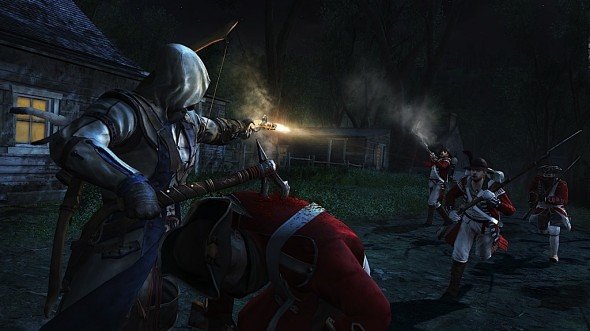
PCG: So will Desmond be back in some sort of playable capacity?
AH: Back and bigger than ever. But we're not allowed to talk about that.
PCG: Less first-person-ey than ever...?
AH: Way less first-person-ey than ever. [laughter] And not in a coma at all. Active! Doing things!
PCG: And then, as my last question, will you ever, at any point, give me some incredibly small window of time to hug George Washington, and then take it away? At which point he'll have this look of utter dejection on his face that'll leave me heart-broken and guilt-ridden until such a time that the man himself rises from the grave to forgive me?
AH: Like Leonardo [da Vinci]? It should be a high-five, like you can high-five George Washington [laughs]. We like that sort of stuff. When we can squeeze it in past the producers when they start canceling features, then we'll put it in.
Want more? Check back tomorrow to learn more about the weapons and mechanics in Assassin's Creed III in Part 2 of our Interview.

